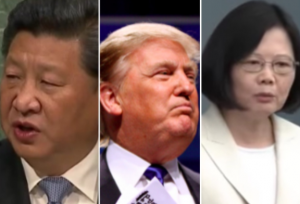 U.S. President-elect Donald Trump is once again talking about Taiwan. Nobody, it appears, is happy about his comments on the close to four-decade old U.S.-China relations.
U.S. President-elect Donald Trump is once again talking about Taiwan. Nobody, it appears, is happy about his comments on the close to four-decade old U.S.-China relations.
During an interview that was broadcast on Sunday, Trump announced that the U.S. would not be bound necessarily by the “One China policy,” which is the diplomatic understanding underpinning ties between Beijing and Washington, unless it was able to make a deal on trade between the two powers.
That remark elicited angry responses from China, with the Beijing Foreign Ministry expressing concern and a newspaper controlled by the Communist Party calling the U.S. president-elect as ignorant as a young child.
The Trump comment came not even two weeks since he spoke on the telephone with Tsai Ing-Wen the leader of Taiwan, which surprised many and interpreted by many as a big slip up, while others called it much overdue support for a friend who is democratic.
The latest Trump foray into affairs of East Asia came when Trump was asked on Sunday about the planning that surrounded the December 2 call. Trump said he learned of the call just an hour or two prior to it taking place, but did understand all that was at stake.
He said he fully understands the U.S. One-China policy. However, he does not know why the country must be bound by it, unless a deal is made with China that is related to other things such as trade.
He added that the U.S. was being hurt badly by China due to devaluation, with heavy taxes at borders when the U.S. does not tax them, through building a large fortress in the South China Sea, that China should not do and not helping at all in the case of North Korea.
Trump said he did not want China dictating to him.
Since he won the presidential race, Trump’s comments in public and his tweets on politics in East Asia have put that region on the edge and have thrown the futures of U.S. Taiwan and U.S. China relations in doubt.
When Trump spoke with Tsai Ing-Wen, diplomatic practice of decades was broken. It was the first call of that type since diplomatic recognition was changed in 1979 by Jimmy Carter from Taiwan to China.
The move by Trump was rejected vehemently by China, which lodged a complaint in the U.S.
